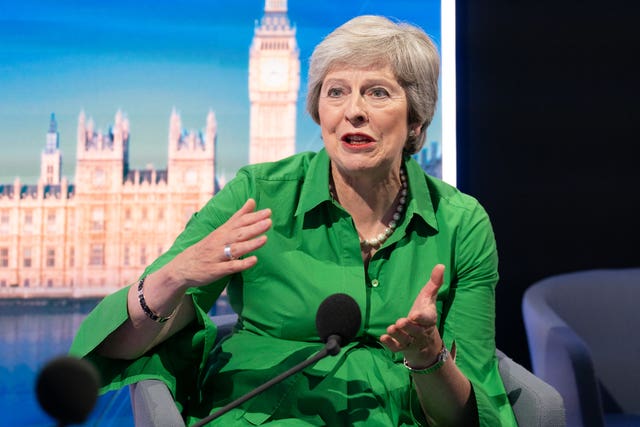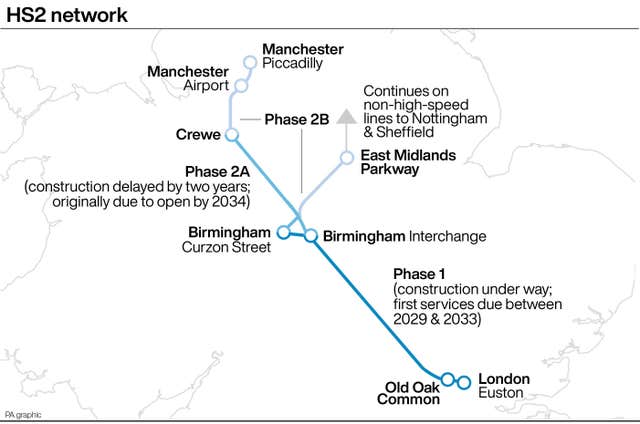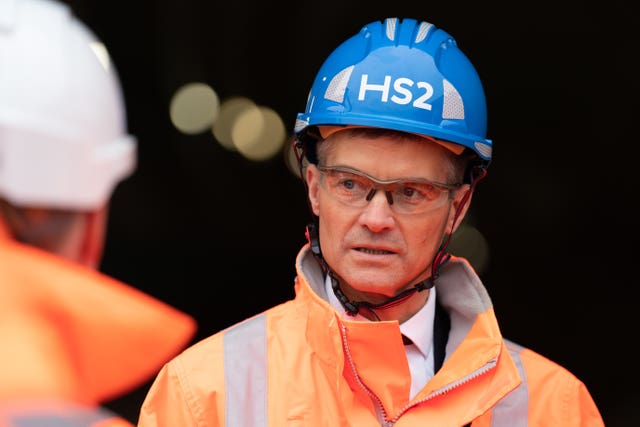Theresa May has become the latest former Conservative prime minister to call for HS2 not to be scaled back following concerns the Birmingham to Manchester leg could be ditched.
The former Tory leader, who was in Downing Street between 2016 and 2019, said she was in favour of HS2 being delivered because extra capacity is required on the railway line to the North West of England.
She also confirmed that she had lobbied ministers urging them not to abandon having a redeveloped Euston station as the London terminus for the high speed line, following suggestions a drastic cost-cutting exercise could see it end at Old Oak Common in the capital’s western suburbs.
Mrs May follows Boris Johnson, who has been vocally against any moves to further trim the route, and David Cameron, said to have raised his concerns with Downing Street in private, in urging the Prime Minister not to axe HS2’s northern arm.
HS2, announced by the last Labour government but backed by successive Tory administrations, was in 2015 given a £55.7 billion budget for its route from London to Birmingham with a Y-shaped section to Manchester and Leeds.
But reports have suggested its costs have breached the £100 billion mark, even with the Leeds element having been binned in 2021.

“If the Government has anything to say, we’ll say that in the usual way in due course,” he told Times Radio.
The stonewalling by ministers has not stopped senior Tories from lobbying Downing Street over the rumours of a scale back, with Mrs May becoming the latest party grandee to intervene in the debate.

“I will give you two comments on HS2. First of all, we have to think about why HS2 was designed in the first place.
“It was because there was a lack of capacity on the West Coast Main Line.
“So if there is a lack of capacity on the West Coast Main Line, we need more railway capacity to serve the North West.”
She said there was also an issue for her constituents if the line does not end up terminating in Euston, in central London.
“If HS2 stops at Old Oak Common, it is going to make our railway journeys into London longer and disrupted potentially over the period that Old Oak Common’s building is being done to enable it to take that end point,” she added.
“So I am arguing with Government: ‘Don’t stop at Old Oak Common. You need to take it into Euston because my constituents will be disadvantaged if you don’t’.”

Mr Johnson expanded on his concerns in his Daily Mail column on Saturday, arguing the Tory Government would be “betraying the north of the country and the whole agenda of levelling up” if HS2 to Manchester is delayed or cut.
He said suggestions that the southern terminal could become Old Oak Common instead of Euston in central London would leave HS2 as a “white elephant”.
Sir Jeremy Wright, a former attorney general and culture secretary, added his voice to the mix, pressing ministers to “finish the job”.
He said HS2 would never have been given approval by Parliament if it had only been intended for 225mph trains to travel between the capital and Birmingham, saying the “strategic benefits just aren’t there” and that the “price of it would simply be too high”.
Phase 1’s budget was set at £44.6 billion at 2019 prices, with recent increases in inflation likely to have taken that higher.
He told BBC Radio 4’s Today programme that, with housing demolished and ancient forests having been ripped up to make way for HS2, his constituents wanted the benefits they were initially promised in exchange for going through “local pain”.
“I don’t think that gain, that advantage strategically to the nation, comes from a single line that runs from London to Birmingham,” he said.
“So I think it is important, not just for my constituents but from the strategic point of view, that we complete the network at least as far as Manchester, and I hope one day beyond that.
“We need to finish it in a way that delivers its intended benefits.”
Sir Jeremy said that, while some of the rising costs of HS2 had come from “bad management”, other financial pressures were the result of “delivering responsibly a major strategic transport project in a small and crowded island like ours”.
The Phase 1 bill has increased due to lobbying, including from MPs, for more of the route to be tunnelled underground to avoid spoiling the landscape or being routed through communities.






